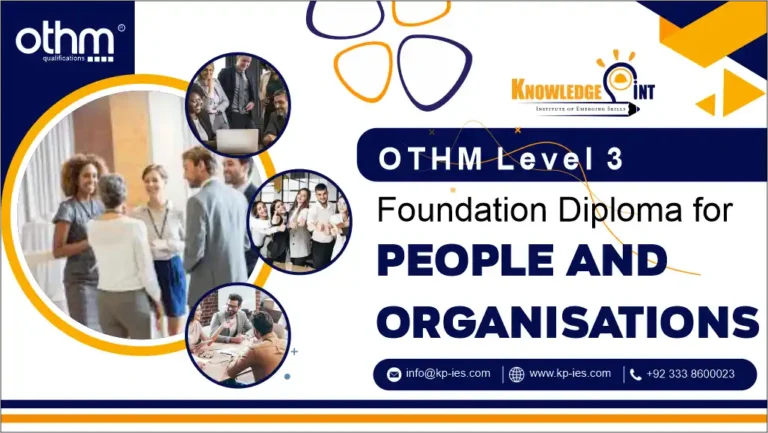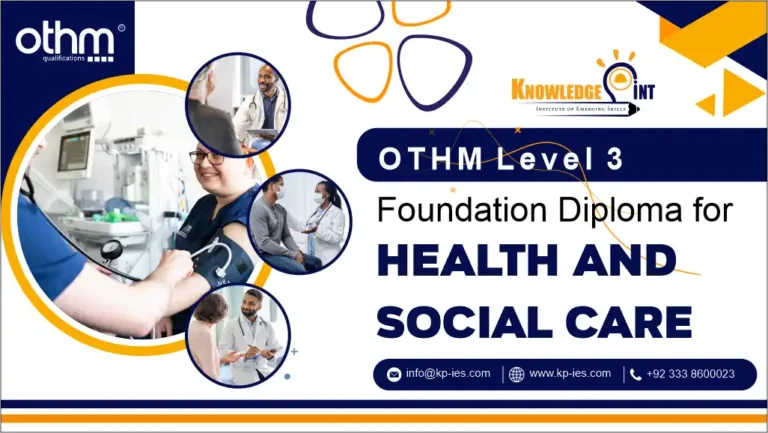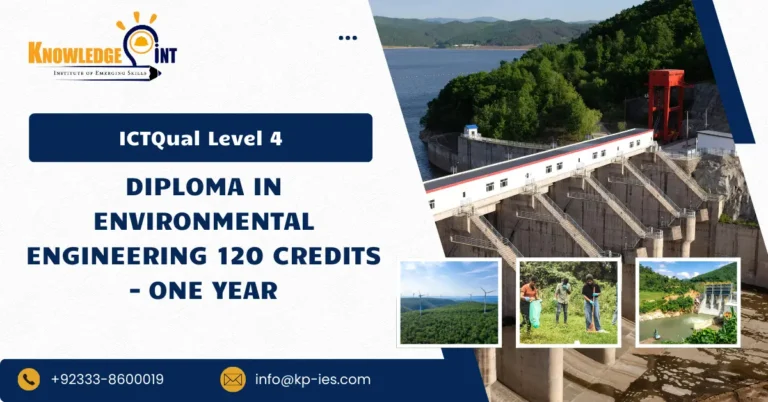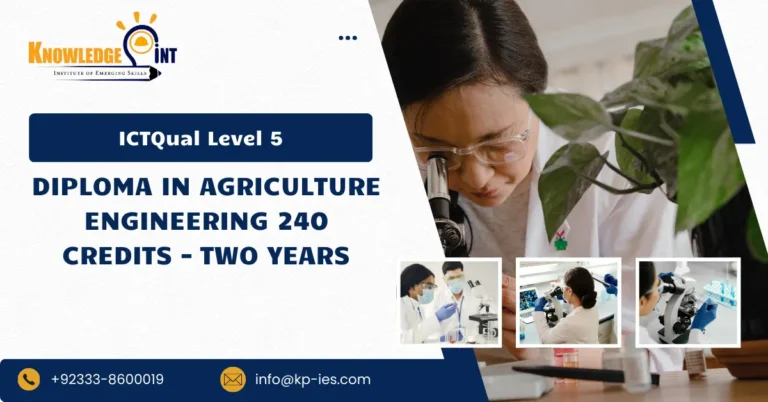The ICTQual Level 5 Diploma in Information Technology Engineering is an intensive two-year program that provides students with 240 credits, equipping them with the technical knowledge and practical skills required to excel in the dynamic IT industry. This diploma is ideal for individuals seeking to establish a strong foundation in IT engineering and gain industry-relevant expertise to pursue professional roles or further education.
The ICTQual Level 5 Diploma in Information Technology Engineering is a stepping stone to a successful career in the IT sector. By balancing foundational knowledge with advanced skills, the program ensures students are ready to meet the demands of a technology-driven world.
Whether you’re starting your journey in IT or looking to advance to higher education, this diploma offers the tools and expertise to achieve your goals.
Course Overview
The ICTQual Level 5 Diploma in Information Technology Engineering 240 Credits – Two Years consists of 24 mandatory units which are as follows.
Year 1 (120 Credits)
Year 2 (120 Credits)
The future progression of the ICTQual Level 5 Diploma in Information Technology Engineering 240 Credits – Two Years can lead learners towards several pathways, depending on their career goals and aspirations in the field of law and related sectors. Here are some potential avenues of progression:
Learning Outcomes for Year 1 (120 Credits)
- Principles of Information Technology Engineering
- Demonstrate an understanding of fundamental IT engineering concepts and their application in solving technical problems.
- Apply basic IT engineering principles in designing and implementing simple systems and solutions.
- Computer Hardware and Architecture
- Identify and explain the components and architecture of computing systems.
- Analyze the functionality of hardware components and their interaction within a computer system.
- Networking Fundamentals
- Understand and explain networking principles, including network topologies, protocols, and the OSI model.
- Set up and troubleshoot basic network configurations.
- Operating Systems and Software Applications
- Understand the role and functions of operating systems in managing hardware and software resources.
- Use and manage software applications for various tasks, including word processing, data analysis, and media creation.
- Database Management Systems
- Design, implement, and manage simple relational databases.
- Use SQL for querying, manipulating, and maintaining data in a database.
- Web Technologies and Development
- Develop basic websites using HTML, CSS, and JavaScript.
- Understand the fundamentals of web design and usability principles.
- Programming and Software Development
- Write and debug programs in a high-level programming language (e.g., Java, Python).
- Apply software development methodologies, including basic testing and version control.
- Data Communication and Networking
- Understand data communication techniques and protocols used for transmitting information across networks.
- Demonstrate an understanding of key concepts such as bandwidth, latency, and network media.
- IT Project Management
- Plan, execute, and monitor small-scale IT projects using fundamental project management tools and techniques.
- Develop project timelines, track progress, and deliver results within scope and budget.
- Cybersecurity Fundamentals
- Identify common cybersecurity threats and understand basic techniques for safeguarding IT systems.
- Implement fundamental security measures to protect information and infrastructure.
- System Analysis and Design
- Analyze user requirements and translate them into system specifications.
- Design simple systems that meet specific user needs and specifications.
- Introduction to Cloud Computing
- Understand the basic principles of cloud computing, including deployment models (public, private, hybrid).
- Use cloud services for simple applications, such as file storage and computing resources.
Learning Outcomes for Year 2 (120 Credits)
- Advanced Networking Technologies
- Configure and manage advanced network protocols and architectures, including LANs, WANs, and VPNs.
- Diagnose and troubleshoot complex network issues, ensuring optimal performance.
- IT Systems Integration
- Integrate hardware and software components into a cohesive IT system.
- Ensure interoperability between diverse systems and platforms, considering business requirements.
- Data Structures and Algorithms
- Implement and optimize data structures such as arrays, lists, stacks, queues, and trees.
- Apply algorithms to solve computational problems efficiently, focusing on time and space complexity.
- IT Governance and Risk Management
- Develop IT governance frameworks that align with organizational goals and standards.
- Assess, manage, and mitigate IT-related risks, ensuring compliance with relevant laws and regulations.
- Mobile Application Development
- Design, develop, and test mobile applications for various platforms (iOS, Android).
- Implement user-friendly interfaces and integrate mobile apps with cloud services.
- Software Engineering and Testing
- Apply software engineering principles to design, develop, and test robust applications.
- Use various testing techniques to ensure software functionality, reliability, and performance.
- Advanced Database Management
- Design and manage advanced database systems, focusing on performance optimization and security.
- Implement complex queries, stored procedures, and database triggers to enhance system functionality.
- Artificial Intelligence and Machine Learning
- Understand AI and machine learning concepts, including supervised and unsupervised learning.
- Develop simple machine learning models and algorithms to analyze data and automate processes.
- Enterprise Resource Planning (ERP) Systems
- Understand the architecture and functionality of ERP systems.
- Configure and customize ERP solutions to support business operations and decision-making.
- IT Infrastructure Management
- Manage and maintain IT infrastructure, including hardware, networks, and servers, to support business operations.
- Ensure system scalability, reliability, and security.
- E-Commerce Systems and Security
- Develop secure e-commerce platforms and systems that support online transactions.
- Implement security measures to protect e-commerce systems and ensure safe user interactions.
- Final Year Project and Professional Practice
- Design and implement a comprehensive IT solution, addressing real-world problems and challenges.
- Demonstrate professional practice skills, including communication, teamwork, and ethical considerations in IT projects.
- Apply the knowledge gained throughout the program to deliver a fully functioning IT project.
Course Benefits of the ICTQual Level 5 Diploma in Information Technology Engineering 240 Credits – Two Years :
1. Specialized Expertise
- Auditing Proficiency: Gain specialized knowledge and skills in auditing energy management systems according to the ISO 50001:2018 standard.
- Industry Recognition: Earn a globally recognized qualification that demonstrates your proficiency as an energy management systems auditor.
2. Career Advancement
- Expanded Career Opportunities: Qualify for roles such as Lead Energy Auditor, Energy Management Consultant, or Compliance Officer.
- Higher Earning Potential: Enhance your value to employers and increase your earning potential with specialized expertise in energy management auditing.
3. Industry-Relevant Skills
- Practical Application: Acquire practical skills and techniques for planning, conducting, and documenting energy management system audits.
- Effective Communication: Develop communication skills to interact with auditees, audit teams, and stakeholders effectively.
4. Contribution to Sustainability
- Promotion of Energy Efficiency: Play a key role in promoting energy efficiency and reducing environmental impact within organizations.
- Support for Sustainable Practices: Assist organizations in implementing and maintaining energy management systems that support sustainability goals.
5. Quality Assurance
- Compliance Assurance: Help organizations achieve compliance with ISO 50001:2018 requirements and other relevant regulatory standards.
- Risk Mitigation: Identify areas of non-conformance and provide recommendations for corrective actions to mitigate risks.
6. Continuous Professional Development
- Lifelong Learning: Engage in continuous professional development by staying updated with the latest developments and trends in energy management auditing.
- Networking Opportunities: Connect with industry professionals, auditors, and experts, expanding your professional network and opportunities.
7. Organizational Benefits
- Improved Performance: Contribute to the improvement of organizational energy performance through effective auditing and recommendations for continuous improvement.
- Enhanced Reputation: Help organizations build a positive reputation for their commitment to energy management and sustainability practices.
8. Personal Growth
- Leadership Development: Develop leadership skills to effectively manage audit teams, delegate tasks, and ensure audit objectives are met.
- Confidence Boost: Gain confidence in your abilities as an energy management systems auditor through practical training and hands-on experience.
The ICTQual Level 5 Diploma in Information Technology Engineering 240 Credits – Two Years provides students with a strong foundation in IT principles and practices. Upon completing this diploma, students can progress in various directions based on their career interests, continuing education, or professional development goals. Here are some key pathways for future progression:
1. Further Education and Advanced Qualifications
- ICTQual Level 6 Diploma in Information Technology Engineering
After completing the Level 5 diploma, students can continue their studies with the ICTQual Level 6 Diploma in Information Technology Engineering. This advanced qualification deepens technical expertise, focusing on more specialized areas such as cloud computing, artificial intelligence, advanced networking, and IT systems integration. The Level 6 qualification also includes practical applications, research, and a capstone project, further preparing students for leadership roles in IT engineering. - Bachelor’s Degree in Information Technology or Computer Science
Students with a Level 5 diploma may also choose to pursue a Bachelor’s degree in Information Technology, Computer Science, or a related field at a university or higher education institution. This degree will offer an in-depth academic exploration of IT topics, possibly including advanced algorithms, enterprise system architecture, and software development, while further enhancing research and analytical skills. - Master’s Degree in IT, Engineering, or Cybersecurity
For those looking to advance their careers in specialized fields, a Master’s degree in IT or a closely related field such as Cybersecurity, Artificial Intelligence, or Software Engineering is a valuable next step. A master’s degree opens doors to senior management roles, research positions, and specialized technical roles.
2. Industry Certifications and Professional Development
- Cisco Certified Network Associate (CCNA)
For those interested in networking and telecommunications, pursuing certifications such as Cisco’s CCNA can provide specialized networking skills. This globally recognized certification validates knowledge in managing and configuring networks, making graduates more competitive in network administration and systems engineering roles. - CompTIA Certifications (A+, Network+, Security+)
CompTIA offers certifications that cover a broad range of IT topics, including hardware, networking, and security. These certifications are valuable for entry- to mid-level IT support, network administration, and cybersecurity roles. - Certified Information Systems Security Professional (CISSP)
Graduates with an interest in cybersecurity may pursue certifications like CISSP. This internationally recognized qualification is ideal for those seeking roles as information security managers, network security engineers, or IT security specialists. - Project Management Professional (PMP)
For students interested in managing IT projects, obtaining PMP certification can significantly enhance career prospects. This certification is globally recognized and focuses on effective project management practices, essential for senior roles in IT management and consulting.
3. Career Opportunities in IT Engineering
Graduates of the ICTQual Level 5 Diploma in Information Technology Engineering are well-equipped to enter various roles in the IT industry. Some potential career paths include:
- IT Support Engineer
Supporting organizations in troubleshooting hardware and software issues, maintaining IT systems, and ensuring smooth daily operations. - Network Administrator
Managing and maintaining computer networks within an organization, ensuring their security and performance. - Software Developer
Developing software applications, websites, or mobile apps. A solid foundation in programming, web technologies, and databases allows graduates to build solutions for businesses or consumers. - Cybersecurity Analyst
Identifying, preventing, and mitigating cybersecurity risks. This is an increasingly crucial role as organizations seek to protect their data and systems from cyber threats. - Systems Analyst
Analyzing an organization’s IT systems and infrastructure to ensure they meet business needs and are optimized for efficiency. - Cloud Solutions Engineer
Designing, deploying, and managing cloud-based IT infrastructures. Graduates with expertise in cloud computing can pursue careers in cloud architecture and services. - Business Intelligence Analyst
Using data analysis tools and techniques to interpret data, identify trends, and provide actionable insights to help businesses make informed decisions.
4. Entrepreneurship and Freelance Opportunities
Graduates with a Level 5 diploma may also choose to start their own businesses or work as freelancers. Potential entrepreneurial paths include:
- IT Consultancy
Providing technical advice to businesses on optimizing their IT systems, integrating new technologies, and securing their networks. IT consultants help businesses with tailored solutions for infrastructure, cloud migration, and IT security. - Freelance Web or Mobile App Development
With skills in web development, mobile app development, and software engineering, graduates can work as freelancers to build custom websites, apps, and software for clients in various industries. - Cybersecurity Consultant
With the increasing demand for cybersecurity services, graduates can become independent consultants, offering security assessments, vulnerability testing, and security system implementation for businesses.
5. Industry Trends and Emerging Technologies
The rapid pace of technological advancement in IT engineering opens numerous opportunities in emerging fields. Graduates may decide to specialize in areas such as:
- Artificial Intelligence (AI) and Machine Learning
As AI and machine learning continue to transform industries, graduates may focus on data analysis, predictive modeling, or developing intelligent systems for automation. - Internet of Things (IoT)
IoT specialists design and implement systems where devices and sensors communicate to provide data, such as in smart homes, connected factories, or autonomous vehicles. - Blockchain Technology
With the rise of blockchain in sectors like finance and supply chain, graduates may work on developing blockchain applications, smart contracts, and distributed ledger technologies.
6. Opportunities for International Work
The ICT sector is global, and with the right qualifications and experience, graduates can work in IT engineering roles internationally. Whether it’s with multinational corporations or specialized IT firms, there are opportunities for skilled IT professionals to find work in diverse countries, particularly in regions with high demand for technology professionals.







